#ugaritic costume
Explore tagged Tumblr posts
Text

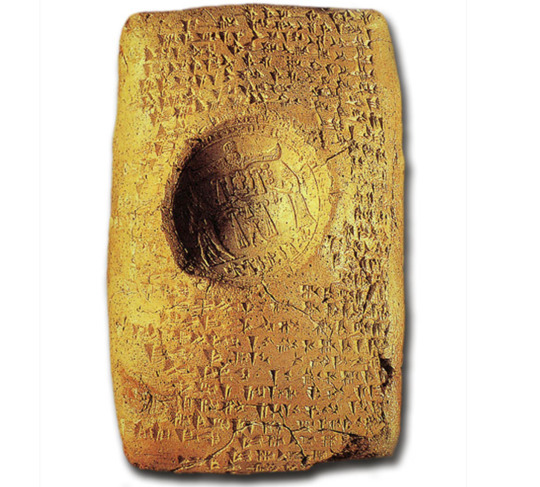
Divorce-Writ of King Ammistamru II Ugarit, Syria c. 1250 BCE A tablet documenting the divorce of King Ammistamru II of Ugarit fromhattusa the daughter of the Amorite king Benteshina, sealed by the Hittite King Ammistamru. The king stands to the right, holding a spear, next to the "Weather God" who holds a club. They are both facing a long-robed female goddess (Arima, the chief Hittite sun-goddess) who stands at the left. Source: Virtual Museum of Syria
#ugarit#hittite#baal#hadad#ugaritic costume#arima#sun goddess#huttusa#hittite gods#canaan#canaanite gods#phoenicia#phoenician gods#aram#aramean gods#syria#syrian gods#levantine gods#mesopotamia#mesopotamian gods#pagan gods#polytheism#archeology#magic#witchcraft#witchblr#paganblr#occult
285 notes
·
View notes
Text
youtube
To find the oldest known complete song, you need look back just 3,400 years. Composed of lyrics, musical notation and tuning instructions for a Babylonian lyre carved into a clay tablet, it is called Hymn to Nikkal, or Hurrian Hymn No 6. Archaeologists found it in the early 1950s – alongside almost three dozen other, incomplete, Hurrian hymns – during an excavation at the Royal Palace of Ugarit in what is now northern Syria.
38 notes
·
View notes
Text
A Hittitology student liveblogs Red River
I’ve just started reading Red River: Anatolia story, a manga set in the Hittite empire. As someone studying the Hittite language and civilisation at university, I thought it might be fun to liveblog it. We’ll see if we learn something along the way - and if not, we’ll hopefully have some laughs!
My thoughts on the first two chapters are here.
My summary of chapters 3-7
I have a lot of trouble believing this Muršili is actually Muršili II, but he’s a decent character so I don’t mind too much
Tito is a darling and also my favourite character
my other favourite character is Mr "Gyahahaha this skin will be mine!” (Zuwa?)
I love the backgrounds, but I’m pretty skeptical about the costumes
more water magic, I love it
TITO NO
Skin Guy is really quick at sewing hats
the author has a very wobbly grasp of Hittite history and geography, though she does get some things right
YUURI NO
this story is my new guilty pleasure
Liveblog under the cut (spoiler warning!).
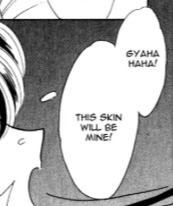
“gyahahaha” I love this guy so much omg
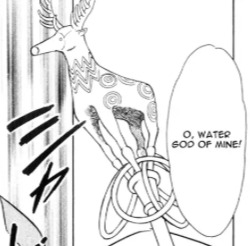
This stag deserves some recognition. Stags were highly sacred to the Hittites, and particularly associated with the God Kurunta, so it’s great to see one depicted. This one here bears a lot of resemblance to an actual Hittite stag rhyton - I wouldn’t be surprised if the author drew inspiration from it.
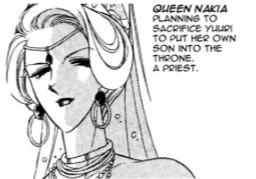
I’m still not over the fact Tawananna Malnigal is called Nokia Nakia
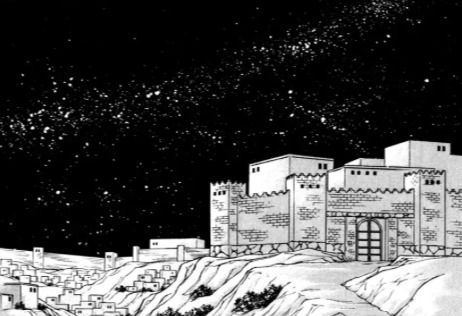
I LOVE these depictions of Ḫattuša by night. It reminds me just how much more visible the stars would’ve been. Not to mention the architecture is spot on too. Gods, this is beautiful.

Il Vani??? What kind of Hittite name is that? According to Google Translate it’s Italian for “The Doors”, which is now what I will call him.
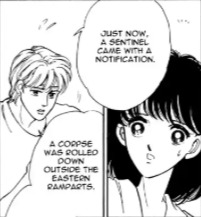
TIṬ’Ḏ TITO??????????
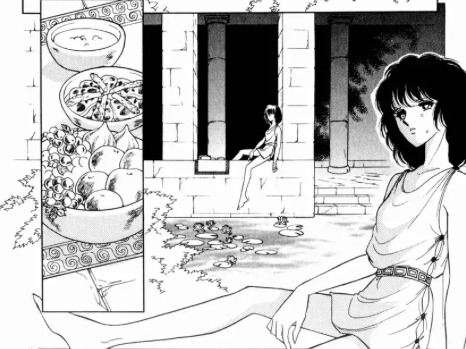
I’m not sure what that food is supposed to be, but it looks historically accurate. What the hell is Yuuri wearing, though? Where does she think she is? Ancient Greece?

Fyi I lose it every time The Doors appears

... then what are the people of Ḫattuša going to drink? Wells aren’t just for magic, you know.
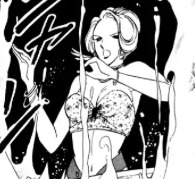
Nokia??? Why are you wearing a bra???
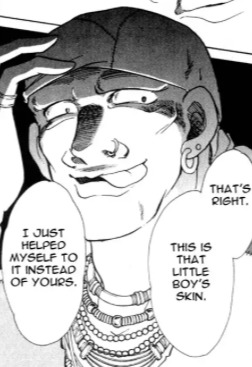
Okay, this is definitely a morbid remark, but I’m not sure Skin Guy would’ve had time to tan Tito’s skin and make it into a hat. It’s been what, a day? Wikihow tells me tanning skin properly takes several months, and even rawhide takes several days according to eHow. Even if Skin Guy didn’t treat it at all (which, yuck), he would’ve still had to sew it, and he doesn’t look like the type of person to sit by candlelight all evening and craft himself a neat little Tito-hat because he simply had to look dashing for Yuuri’s ritual in the morning.

Is it me or is Nokia’s clothing getting more and more revealing with each chapter? Will she be naked by chapter 20? Flayed by chapter 50? By the last chapter, nothing but a pile of bones?
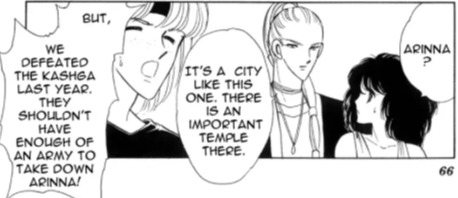
1) Bold of you to assume the Gašga aren’t the embodiment of recklessness and wouldn’t fight you bare-handed if it meant spiting the Hittites, 2) Arinna is a DAY away from Ḫattuša, this is both a massive threat to the empire, and highly unlikely

Headcanon: The Doors is gay and in love with Muršili.

????? Or, you know, he can’t take the throne because he’s already king in Aleppo. I mean, that’s fine if in this story Telepinu is of lower birth, but he was still very much king in Aleppo.
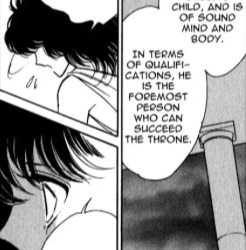
This is the single most inaccurate panel I’ve come across so far. Several things need pointing out: first, if everyone agreed Muršili was the best candidate to the throne, how come everyone dismissed him and called him an incapable child when he became king? Second, Muršili wasn’t of sound body, he had speech problems (though admittedly those may have developed in later years). And third, the new king’s wife didn’t become Tawananna. The Tawananna stayed Tawananna until her death. That was literally the entire basis of the conflict between Muršili and his stepmother (Nokia).

These giggles are very unsettling. Is this common in manga?
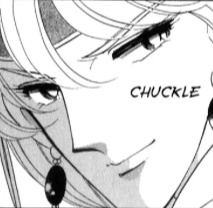
This. This killed me. Along with the awkward closeup with a very small “Geez.”, this is my favourite panel of Muršili.
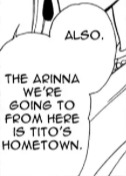
Oh no, my headcanon that Tiṭ’ḏ was from Ugarit has been proven wrong :(

This made me laugh and deserves recognition. Study hard in history class, kids

Actually the Hittites called the Halys the Maraššantiya. Halys is a Greek word meaning “salty”, and it wouldn’t become the river’s name until, surprisingly, the Greeks got there.
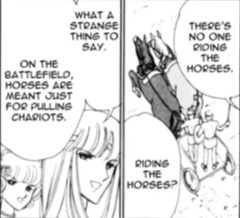
Yay, some historical accuracy!

Breaking news: Japanese has a word for “sound of a person jumping on a horse”. Also breaking news: I’m crying

This is a neat carving but the art style is way too realistic for a civilisation whose art J.G. Macqueen once called a “disappointment”
#red river#anatolia story#red river liveblog#<= this is the tag to block if you don't want to scroll past my liveblogs (since i've heard 'read more' doesn't work on mobile)
124 notes
·
View notes
Text
“I will slay my brother’s slayer.” (KTU 1.19 iv.28-49)

This is a short excerpt from Aqhat, one of the three surviving Ugaritic epics. The tale centers on Danel the Harnamite, a wise and pious judge who prays for a son and is granted Aqhat … only to watch him make sexist remarks to the war-goddess Anat and get killed for his arrogance. Danel was probably a mythic sage, since he also appears in the Bible (e.g. Ezekiel 28:3) and may have inspired the Biblical book of Daniel [1].
Pugat, Danel’s daughter, is a fascinating character. We’ve lost her first appearance (the text is broken in several places), but she appears to possess both martial strength and prophetic wisdom. While her father merely mourns Aqhat and curses everyone who watched him die, Pugat prepares to take vengeance on the human mercenary Yatipan, who killed Aqhat at the urging of Anat.In the passage below, Pugat seeks her father’s blessing for her plan. She then puts on warriors’ gear, hiding it under women’s clothes, and plans to approach Yatipan in disguise. An unclear term later has led to two divergent readings of her costume: depending on its translator, she is either dressing as a hired serving-girl (a sex worker?) or as the goddess Anat incarnate. Unfortunately, the text breaks off before we can see the outcome of her planned revenge.
Pugat, She-Who-Shoulders-Waters, said: [2] Father has offered a sacrificial feast to the gods; he has sent up his incense to the Heavenly Ones, the Harnamite’s incense for the Astral Ones. Bless me truly, and I will be blessed; empower me, and I will be empowered. I will slay my brother’s slayer. I will kill the killer of my mothers’ child. [3]
Then Danel, Man of Rapha, said:
By my breath, may Pugat flourish: She-Who-Shoulders-Waters, she who distills dew from fleece, [4] she who knows the paths of the stars. [5] By my breath and body, [6] may you slay your brother’s slayer; may you kill the killer of your mother’s child.
[Pugat wen]t and dove into the sea; she washed herself […] [Her face] and shoulders, she reddened with the seashell which takes a thousand fields to harvest from the sea. [7]
Beneath, she wore a warrior’s garb: she put a d[agger] in her holster; a sword, she put into her bag. But above, she wore a woman’s garb.
[… At] the setting of the sun, the lamp of the gods, Pugat arr[ived] at the encampment on the fields. At the departure of the sun, the lamp of the gods, Pugat appea[red] at the tents...
[1] Fun fact: I gave a paper, a couple years ago, about how the book of Daniel could be a fanfic AU of Danel, preserving a popular character while transplanting him into a colorful new setting.
[2] “She-Who-Shoulders-Waters” is an epithet used of Pugat throughout the story. Its basic meaning is mostly clear, but its implications are still debated. The shoulders are (in ANE literature) the load-bearing part of the body, just as with modern backpacks, and some have seen this as a description of menial labor: Pugat is a water-carrier, like many women in arid parts of the world. But as the daughter of a king, Pugat would not have been a menial laborer — certainly not as her primary occupation. I personally lean toward one of three more religious implications. Water in the ancient Near East was the substance within which the world floated, surrounding it above and below; in Mesopotamian tradition, the god of wisdom dwelled in those waters. The spelling of “waters” here is unusual (mym instead of mm) and may point to those plural waters. So her title may suggest either that Pugat is someone who bears divine knowledge (see below for more of this!), or it may parallel her father’s title by indicating her religious allegiance. Finally, “she-who-shoulders” is the Ugaritic ṯkmt. The word’s masculine form, ṯkmn, is the name of a minor Ugaritic deity — and I believe that due to linguistic processes, ṯkmt is the exact consonantal spelling of the Egyptian goddess Sekhmet. Note that Sekhmet was, like Pugat, a goddess of wisdom and warfare, and that she specifically dressed in red. I have not seen this latter theory proposed anywhere, and I admit a lack of expertise in Egyptian, so right now this is just speculation. But as a port city, Ugarit had plenty of interaction with other Mediterranean cultures, so an Egyptian connection is far from unlikely.
[3] “My mothers’ child”: both words in this phrase are debated. “Child” (or “young offspring”) is fairly clear, but the word that follows it usually gets translated as “mother’s” or “clan’s.” However, reading it as “mother’s” would mean a very nonstandard spelling. It appears to be a plural term, whether a general family group (kin/clan) or specifically women (mothers). Since the term is poetically parallel to “brother,” I assume the latter meaning: Pugat and Aqhat share the same mothers. But what does that mean, in a largely patrilineal society? I am hesitant to venture a guess. Perhaps it just implies that Aqhat is her full brother (i.e not Danel’s son by a different mother). Perhaps it connects to a broader theme of women in the story. Not only is Aqhat killed by a goddess, he was first welcomed into the world by a group of goddesses (“the Daughters of Ellil, the Bright Ones”) who presided over conception and birth and were fed by Danel for a week with freshly slaughtered oxen. (More on them here, if you’re curious.) Could “my mothers’ child” refer to the Daughters of Ellil as Pugat’s mothers?
[4] “She who distills dew from fleece”: if Pugat’s first epithet comes from the manual practice of gathering water, then this may simply describe a real technique to gather drinking water during times of drought. Particularly in parallel with the following line, I find a prophetic/magical meaning far more plausible. An intriguing parallel is the biblical story of Gideon, who uses a dew-gathering fleece to as a divinatory sign.
[5] “She who knows the paths of the stars”: this does not simply imply that Pugat has a hobby of astronomy. All three words of this phrase are heavy with ANE parallels to supernatural knowledge. Only one other person uses the verb “to know” in Aqhat: El, the wise father-god. As for “paths,” the term referred to astronomical movements, which were used as a source of divinatory knowledge, as in modern astrology. (Cf. this essay for a discussion of a parallel Akkadian term for an oracular decision, which may have entered Hebrew as the Jewish term halakha.) Finally, the stars were not mere physical phenomena: they were gods in themselves, and other prayers address them directly. In conclusion, this line clearly states that Pugat had the ability to interpret oracular predictions.
[6] “By my breath and body”: translations of this phrase vary, and this translation is very tentative. If correct, the words more literally mean “[by] my breath/life, i.e. my marrow.” Alternately, “marrow” could be a metaphor for some sort of vitality or success (marrow is one of the most high-nutrient parts of the body), in which case the translation might be, “by my breath, may she be vigorous” or “may the breath in her be vigorous.” A different reading of the first word (which is not clear in the original text) leads to the reading, “May she travel smoothly/vigorously.”
[7] These lines overlap notably with two other scenes: the description of Anat’s beautification in the Baal cycle, and the description of Keret’s ritual preparations for sacrifice in the Epic of Keret. In Keret, the eponymous king washes and “reddens” himself; in Baal, Anat beautifies herself with murex dye, “which takes a thousand fields to harvest from the sea.” Both scenes precede significant events (battle and sacrifice, respectively), so Wright has argued that the washing and coloring connects to ritual purification. While I agree with that observation, I also wonder if this scene is *deliberately evoking the combination of the other two, paralleling Pugat’s layered-gender clothing. The verb “redden,” which appears only in Keret and Aqhat, is an exact homonym for the word “man,” and I wonder if this is a deliberate wordplay: a goddess can color herself purple with spectacularly expensive pigment, while the two humans, royalty though they are, paint themselves human/red. Incidentally, the text’s word order leaves it ambiguous whether Pugat’s arms and (face? hands?) are being washed or reddened.
632 notes
·
View notes